Last week I wrote about the hope I saw in the Alabama State Supreme Court’s decision that “embryos are children” (“There is Hope in Alabama”). Unfortunately, it is becoming clear that many people do not get the significance of the decision that “embryos are children.”
What makes it clear that they don’t get it? I am not surprised that those who support abortion don’t get it. If they did get it, they won’t support abortion because they would understand that abortion ends the life of an innocent child.
What does surprise me is how many politicians who are against abortion are now rushing to enshrine in law a right to IVF (In Vitro Fertilization). It seems they don’t understand that the use of IVF involves the creation of “extra” embryos that are frozen and/or destroyed. Is this the way we treat our children?
I’m not surprised that in the past that some people who are pro-life may not have understood all the issues involved in IVF (see my article from last week, “There is Hope in Alabama,”) but I would hope that the Alabama’s State Supreme Court declaring “embryos are children” would make them think and, hopefully, change their thinking on IVF.
Does this take away the hope I saw in the court’s decision that “embryos are children.” I would say that it does lessen my hope in humanity for an immediate change to end all abortion and procedures that end the lives of embryo children. However, it does not take away my hope. Why? First and foremost, because my true hope is not rooted in humanity. My true hope is based on my faith and trust in God. “For human beings this is impossible, but for God all things are possible” (Matthew 19:26). I know God is prolife.
There is an aspect of what is going that keeps some “hope in humanity” alive for me. I have heard of no one arguing that the decision of the Alabama State Supreme Court that “embryos are children” under Alabama law. Why don’t they argue against it?
Perhaps it is because they know it is true.
I think of how many times in the Old Testament people tried to silence the prophets. The story of the prophet Jeremiah in the book in Old Testament that bears his name is a good example. (See my article, “Jeremiah Today”) At times the people tried to silence him. They did not like what he was saying. If he was right, they would have to change their lives. They didn’t try to prove him wrong. I suspect this is because they knew what he said was true. So, they wanted to silence him. Following the decision in Alabama that “embryos are children,” I think they don’t argue against because they know they can’t win and they don’t want to draw any attention to the statement that “embryos are children.”
I think what we are seeing is the fulfillment of what Paul wrote in 2 Timothy. I used the following quote in my presentation, Where Do We Go for Truth.
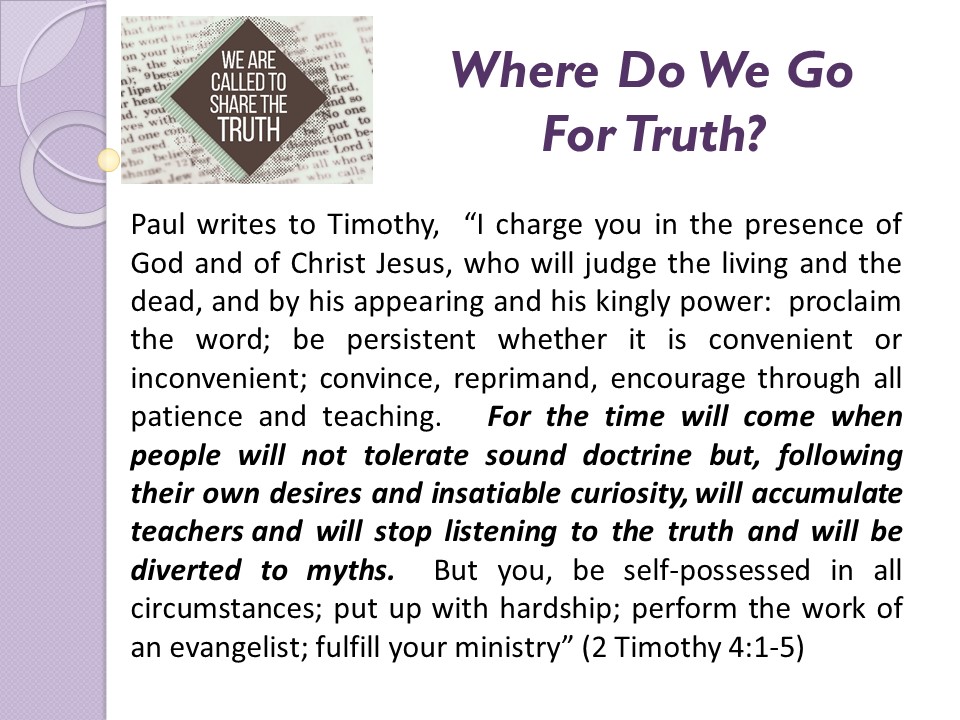
People have stopped listening to the real Truth and have begun making up their own truth. They declare the truth to be what they want it to be. Then, they expect us to “tolerate” their position (see my article “Tolerance, Hate Speech, and Dialogue?“)
Relativism says everyone must be free to decide for themselves what they believe. I agree that we shouldn’t force our beliefs on others. As I quoted in my presentation, Where Do We Go for Truth, the Catechism of the Catholic Church says
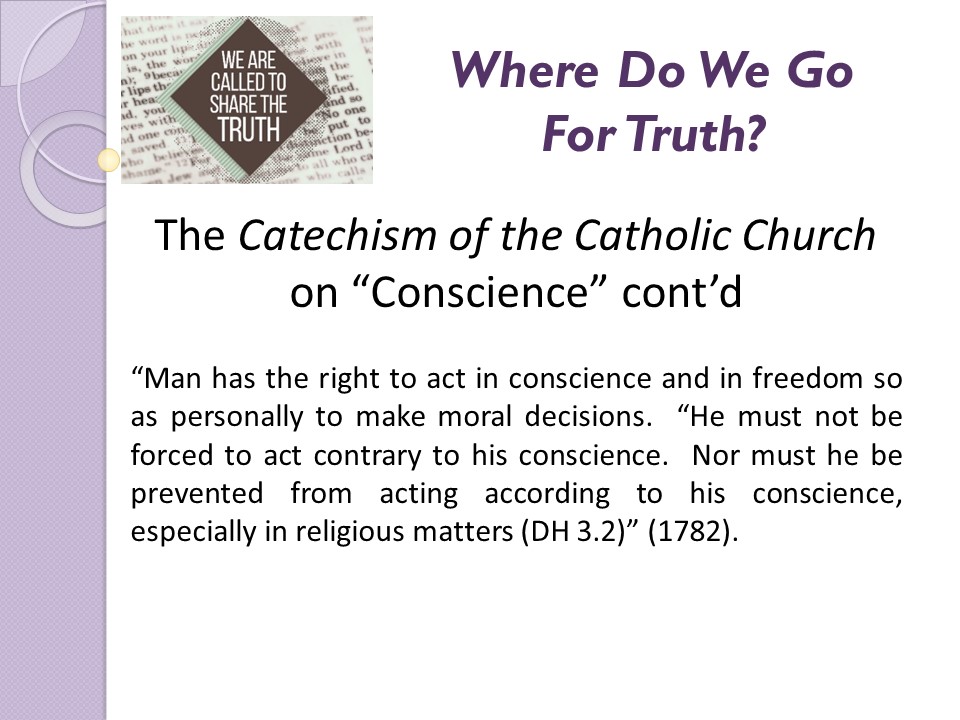
Yes, people have a right to follow their conscience. With this right, they have a duty to have a well-formed conscience.
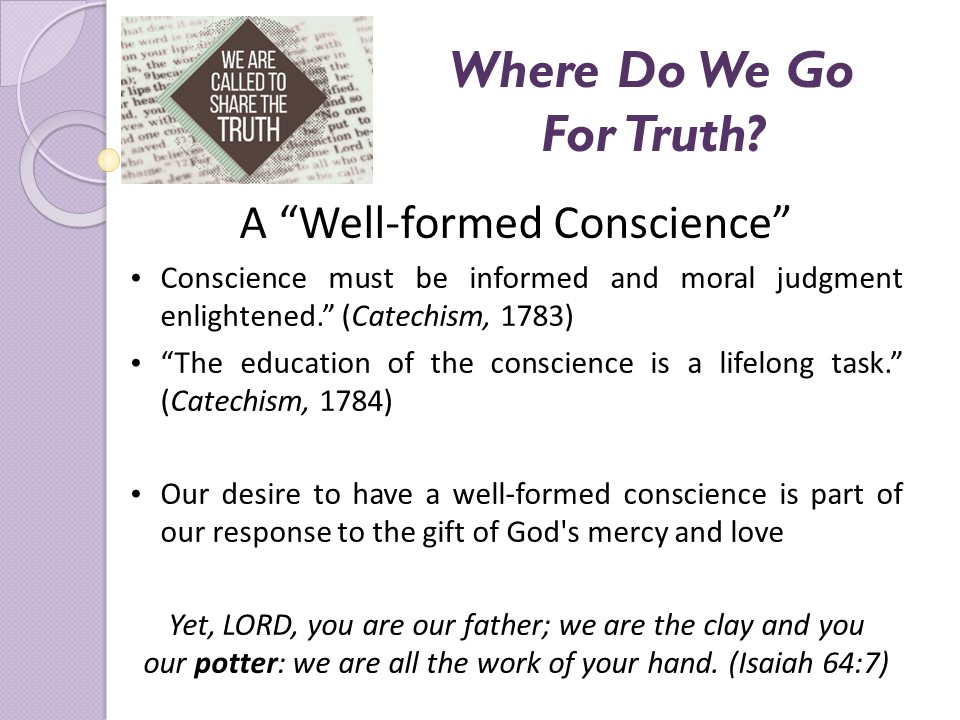
This means we can’t just say we believe “X” and declare it to be based on our conscience. Contrary to what Justice Kennedy said in Planned Parenthood v. Casey (1992), “at the heart of liberty is the right to define one’s own concept of existence, of meaning, of the universe, and of the mystery of human life” (Reilly, Robert R., America on Trial A Defense of the Founding. San Francisco: Ignatius Press. 2020. 6. interior quote “Planned Parenthood of Southeastern Pa. et al,. v. Casey, Governor of Pennsylvania, et a, 505 U.S. 833, 851 (1992) https://www.law.cornell.edu/supct/html/91-744.ZS.html.“), our meaning has to flow from something greater than ourselves.
Christians say in the Lord’s Prayer, thy will be done. We do not pray solely for our own will. We recognize that God is the one who is all-knowing. To ask for something in Jesus’ name is not to ask simply for what we want. To pray in Jesus’ name is to pray that God’s Will be done just as Jesus prayed in the garden, “My Father, if it is possible, let this cup pass from me; yet, not as I will, but as you will” (Matthew 26:39).
The Church is God’s instrument on earth. As Pope John Paul II wrote in Veritatis Splendor, “the Magisterium itself is considered capable of intervening in matters of morality only in order to “exhort consciences” and to “propose values”, in the light of which each individual will independently make his or her decisions and life choices” (Pope John Paul II, Veritatis Splendor, August 6, 1993, access date 3/5/24, paragraph 4).
As we read in Exodus 23:2, “You shall not follow the crowd in doing wrong. When testifying in a lawsuit, you shall not follow the crowd in perverting justice,” the real Truth is not deciding by majority rule. The Truth comes from the One who is greater all of us together.
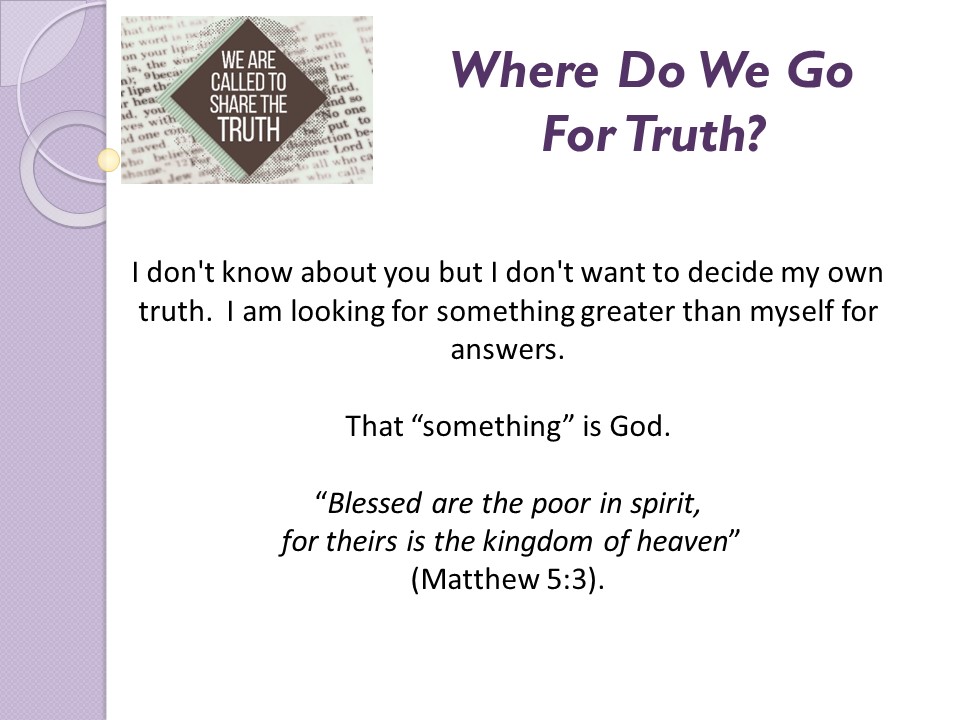
As “Peter and the apostles said in reply, “We must obey God rather than men” (Acts 5:29).
God gives us the gift of reason to learn and understand. However, that doesn’t mean we are going to understand everything. It doesn’t mean we get to pick and choose what we belief (see my article, “Cafeteria Catholic? Not!”). When we don’t understand, we are called to trust in God.
It is time to end the partisan politics. It is time to end the war between Israel and Hamas as well as the Ukraine and Russia. It is time to end religious murders and persecution in Africa. It is time to end the hatred in our country towards illegal immigrants. It is time to love God and to love our neighbor.
The truth? The truth is not a burden. The truth is a gift.
As Pope John Paul II wrote in Veritatis Splendor, “Those who live “by the flesh” experience God’s law as a burden, and indeed as a denial or at least a restriction of their own freedom. On the other hand, those who are impelled by love and “walk by the Spirit” (Gal 5:16), and who desire to serve others, find in God’s Law the fundamental and necessary way in which to practise love as something freely chosen and freely lived out. Indeed, they feel an interior urge — a genuine “necessity” and no longer a form of coercion — not to stop at the minimum demands of the Law, but to live them in their “fullness” (18).
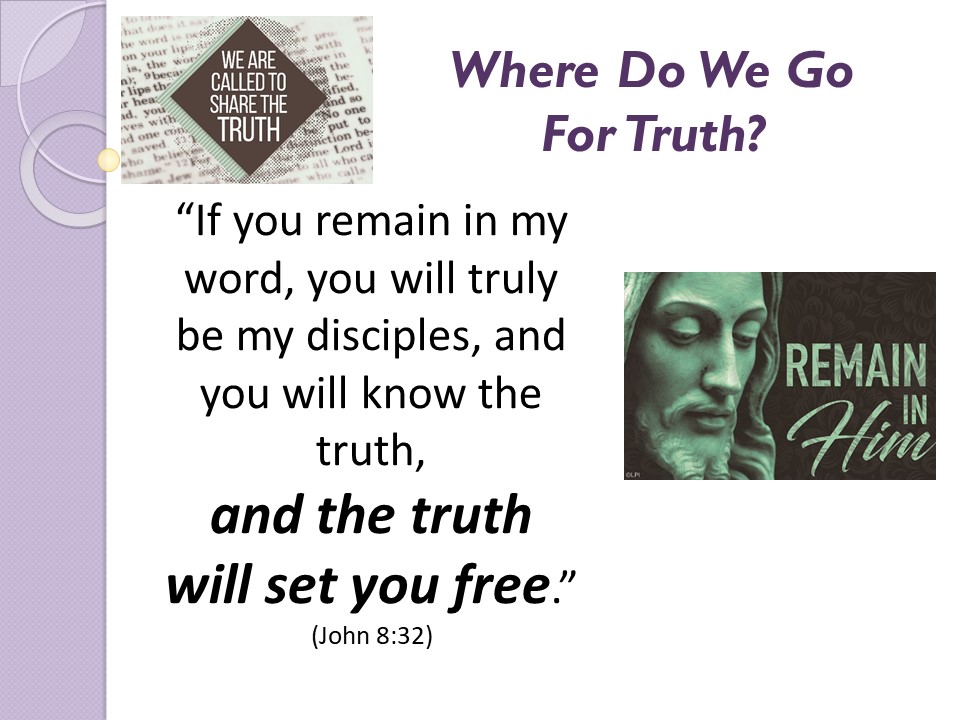
Peace,
Fr. Jeff
